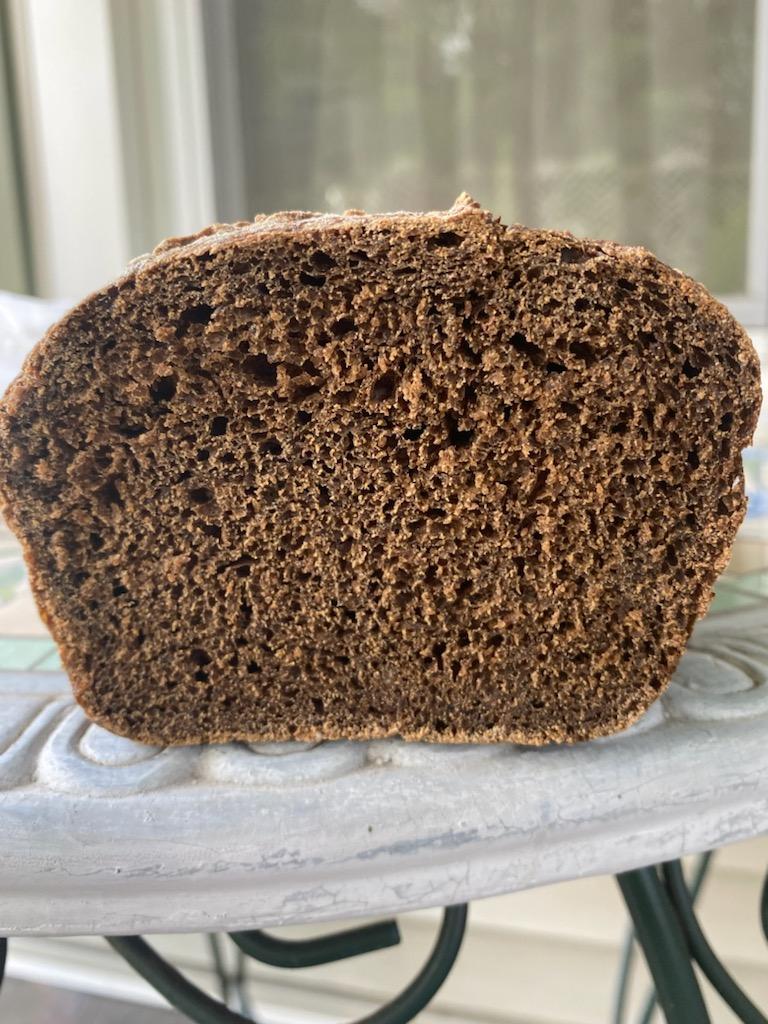
What is Solod (fermented red rye malt)
To better understand what solod is, understanding how it is made should help.
First: Rye grains ( aged for about 6 months) are sprouted till the roots are about the length of the grain.
2nd: The damp sprouted grains are fermented ( a little starter can help this process in small batches) until sour. In commercial operations, the heat from fermentation can raise the temperature up to 120F (much like a compost pile).
3rd. The temperature is artificially raised to 140F then higher up to about 176F. This temperature is where rye starches start to gel, and amylase activity is near its peak for converting starch gels to sugars. The damp grains are kept at this temperature for a day and a half or two.
4th. The grains are dried, with sub boiling temperatures to reveal the aroma and color. This step may also be to deactivate the amylase. If anyone knows for sure let me know.
I know I left out intermediary steps, this is not a recipe, but there is vital information here for people trying to make this at home. If you want to try making it at home from one of the online recipes, buy it first so you know what you are shooting for. Until you've experienced the real thing, you won't know what you are trying to make.
========================
There really is no substitute. Thankfully it is readily available on eBay (search for Solod red rye malt) and online for a reasonable price, way cheaper than making it yourself (but if you have the time and equipment, go for it, fun biology/chemistry experiment).
This is an essential product for many Russian and Eastern European breads. It shouldn't take much imagination to come up with other uses for this fragrant (smells a lot like sour chocolate) malt. Personally, I've incorporated it into an approximation of Russian black bread, and my (in my family) famous banana bread with great success. The next time I make the black bread I'll post a picture here. In the mean time here is a picture of the bread I made with 3oz of solod for the 50% or more community rye bake:




This is a direct cut and paste from the beets and bones website:
INGREDIENTS:
- Rye berries any amount
- Filtered water
InstructionsThe next step is to ferment the rye, and will work best at between 108 and 112F with a rye or clas sourdough added to get things started. 12 hrs was enough for mine
of 113-122ºF (I use a 'bread proof' option on my oven and wrap the dish in foil) for 12 hours. Then I increase the temperature to 140ºF and maintain it for the next 36 hours; until solod darkens in color and has a slight malty aroma.Or, here is a video: https://www.google.com/url?sa=t&rct=j&q=&esrc=s&source=web&cd=&ved=2ahUKEwiNk82u2f36AhWFpokEHRouDoAQtwJ6BAgHEAI&url=https%3A%2F%2Fwww.youtube.com%2Fwatch%3Fv%3D_enQ4zHGM1U&usg=AOvVaw389AGhSxqa1YlvbsCYAKbu
From Yippee: https://brotgost.blogspot.com/2019/06/red-rye-malt.html You will want to use googles translate feature if you don’t speak russian.
When you are finished the grains should be cracker dry and you need to sift out whatever rootlets are mixed in with the grains.
Instead, it's making crystal malt because it lacks the fermentation-with-acid step required to make red rye malt.
It's critical not to confuse germination during the malting process with the fermentation required to make red rye malt.
Here's the correct procedure:
https://brotgost.blogspot.com/2019/06/red-rye-malt.html
Yippee
I suppose I should have modified the B&B recipe (as I did my home brew) to include the fermentation step with a rye sour after the sprouting of the grains. I did, to be fair, include the fermentation step in my description.
Thanks for pointing out that omission, I will modify the B&B post here to include that important step.
In the russian link he suggests starting with a green (unroasted) rye malt - and adding equal parts of rye to water at 40C (104F) with a LAB starter that should turn everything sour overnight as well as absorbing the water. That would certainly speed up the process a bit.
He also has a 3 day “wet” heating compared to the other two posts I included.
@ $7 a pouch this is a bargain on ebay. I did it once (with a shorter heating period) and am not displeased with the results, but I doubt I will ever bother again - so long as it is available online that is.
as described by Beets & Bones:
RUSSIAN RED RYE MALT (SOLOD) COMMERCIAL PRODUCTION STAGES